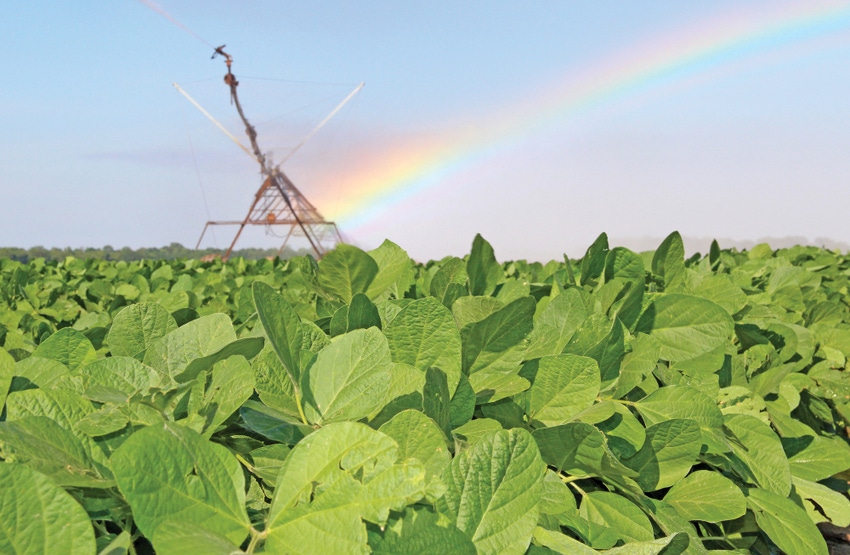
Trudy Fisher, executive director of the Mississippi Department of Environmental Quality, says the greatest natural resource issue for Mississippi "is insuring a sustainable water supply for the Delta."Fisher says farmers’ crop choices should be driven by market conditions and not decided by the amount of water available for adequate irrigation.Solutions will require communication, and exchange of ideas and working together toward a common goal.
August 1, 2012

Farmers’ crop choices should be driven by market conditions and not decided by the amount of water available for adequate irrigation, Mississippi’s lead regulator for the state’s natural resources told attendees at Delta Research and Extension Center’s July 19 Soybean and Corn Field Day in Stoneville, Miss.
“Adequate water for irrigation and aquaculture is essential. We’ve got to have it, because irrigation is the best crop insurance we’ve got. That is an issue that I feel strongly about, and the issuing of well permits will continue to be handled as it is now,” stressed Mississippi Department of Environmental Quality executive director Trudy Fisher.
Read: Peanut profit: irrigation top key
“We’ve got to continue to focus on the future. We don’t have years to waste, and we don’t have decades to find solutions to our water resource issues,” she said. Currently, Fisher has three staff-level work groups helping to find ways to insure Mississippi’s abundant water supply continues. While one group focuses its efforts on education and outreach, another is helping to determine what kind of water metering program is needed and will work best on Mississippi Delta farms. “It’s the next step,” she said. “How can you best conserve water if you don’t truly know how much you are using to irrigate your crop. We can’t solve a problem if we don’t understand it.”
A third, a conjunctive water management work group, is researching both group and surface water use with a goal towards the development of new surface water supplies that are not currently being captured for irrigation use. The goal, Fisher said, is to find new ways to use both groundwater and surface water, as well as to minimize waste.
“It’s clear to me that the greatest natural resource issue for our state is insuring a sustainable water supply for the Delta,” said Fisher.
Water task force
To that end, the Mississippi Delta Sustainable Water Resources Task Force was established in November of 2011 to address concerns regarding declining aquifer levels. The group is tasked with finding a way to work as a unit and bring forward consensus-based solutions to the Delta’s water resource issues. “Persons with skin in the game” sit on the task force board, including well permit holders and representatives of organizations such as Delta Council, the U.S. Army Corps of Engineers, Delta F.A.R.M., Delta Wildlife, the Mississippi Soil and Conservation Commission, USDA’s Natural Resource Conservation Service, and the Mississippi Department of Environmental Quality.
While the Delta is blessed with plentiful water resources through both an annual average of 55 inches in rainfall and an alluvial aquifer, that aquifer is not inexhaustible, Fisher said.
As the state agency in charge of managing water quality and water resources in the state, the MDEQ has, since 1985, required permits for all irrigation wells, with each state-issued permit specifying the maximum amount of water that may be withdrawn from the alluvial aquifer.
For example, well permits allow up to three acre-feet of water use for rice irrigation and up to 1.5 acre-feet of water use for row-crop irrigation. Today, 17,000 wells are permitted in Mississippi for the withdrawal of 500 acre-feet of water per year. “If you have a well in one of the areas of the aquifer experiencing lower water levels, well efficiency will be decreased. Declining water levels in our aquifer also have affected stream flow levels in some parts of the Delta,” she said.
Report: Drought’s effects creeping into Arkansas’ irrigated fields
According to Fisher, the problem of declining aquifer levels can only be solved through a Delta-wide commitment. In addition, Fisher is well aware of the challenges government regulations can cause for producers, saying, “I know that regulations and me sitting in Jackson issuing orders is not the solution.” The list of short and long term solutions will instead come out of the newly formed task force, she says.
While other types of water use permits have inspection and enforcement requirements associated with them, Fisher said “farmers have historically been the best at self-policing because as farmers, you want to insure enough water is available for future farming generations.
“We have begun ‘business as unusual’ to find the solutions, and we don’t have decades to solve the problem. Make no mistake, though, we are going to solve the problem. There is not one solution to this issue. We didn’t get here overnight and we won’t find the solutions overnight. The solutions require we communicate, exchange ideas, and work together.”
You May Also Like



